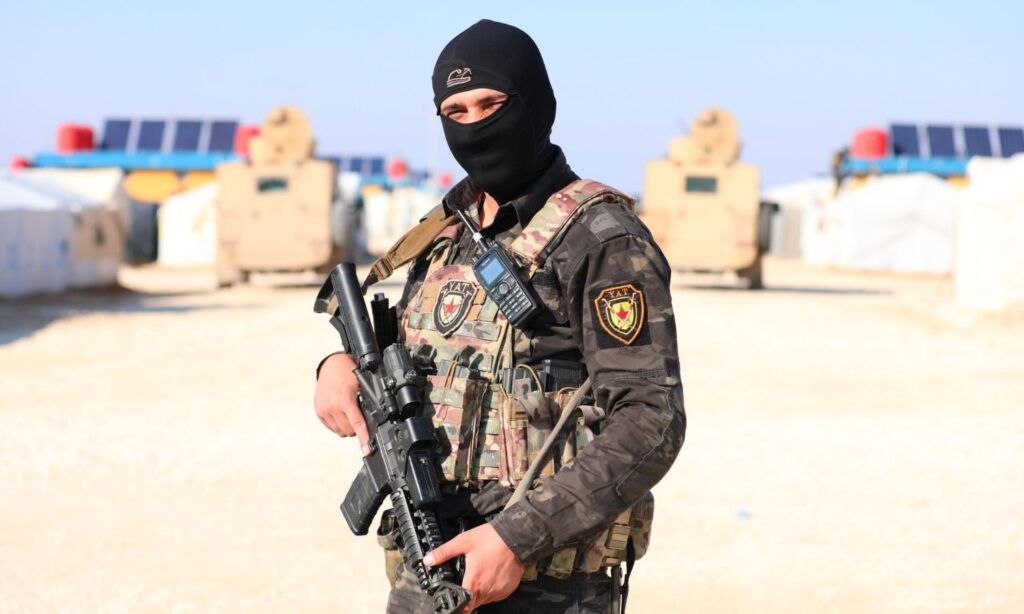Al-Hasakah – Rita Ahmad
Illegal migration of Syrians towards Europe is increasing, including minors who migrate without their parents, due to the ongoing war’s repercussions in the country.
According to the European Union’s Eurostat center, the proportion of minors among first-time asylum seekers in 2022 was 25%, with Syrians making up 20% of this group. Out of 222,100 minor asylum seekers, 19% were unaccompanied.
The reasons for the youth’s departure from the areas of northeast Syria to Europe are numerous, and “child recruitment” by the Syrian Democratic Forces (SDF) is an additional reason that is no less significant than the other causes.
From Qamishli to Norway
“My heart tightens so much when I miss my son, and I wish he would not have to be far away from me, but there was no future for him in al-Hasakah, compulsory recruitment and the lack of educational opportunities make his life difficult,” laments Huda Abdul Latif (41 years old), a resident of al-Qahtaniyah town near the city of Qamishli.
Abdul Latif describes the deep sadness dwelling within her as she talked to Enab Baladi‘s correspondent after her son Fahd al-Hamdi, 15 years old, left his town to Norway in northern Europe a year and five months ago.
She recounted how she sold all her gold and added the money she had inherited from her family to cover the cost of Fahd’s journey, hoping he would receive a good education and escape compulsory recruitment.
She said that her son’s school, which follows the Autonomous Administration’s curriculum, provides an education that is not recognized, making it difficult to obtain proper schooling.
The educational reality in northeast Syria reflects a continuous struggle between the Autonomous Administration of North and East Syria (AANES) and the Syrian regime’s curricula since the former took over the schools in the area in 2014 and banned the use of the latter’s curricula, while the Damascus government does not recognize the certificates issued by the Autonomous Administration’s schools.
According to al-Hasakah Education Directorate, the Damascus government controls only about 10% of the total schools in the province, with the rest being managed by the Autonomous Administration.
There are 2,285 schools in the al-Hasakah province, many of which have suffered varying degrees of damage, while some have been turned into weapon stores and military headquarters for the SDF.
In Qamishli, there are five government free primary schools centered in the “secured” area and around the airport, according to the official Syrian News Agency (SANA). The schools in areas under SDF control face significant difficulties, with more than 90% of the municipality’s schools closed and teaching in them prohibited, leading to the deterioration of the educational situation and the spread of ignorance among children.
The Ministry of Education in the regime’s government has not provided any solutions or facilitations for the people of northeast Syria, where the majority of schools remain under the Autonomous Administration control, and the regime’s recognition is limited to the security squares in the cities of al-Hasakah and Qamishli, and the airport in Qamishli.
Migration, a dream for a better future
Mahmoud Badr (55 years old), a resident of al-Jawadiyah, recounted to Enab Baladi his experience when the SDF conscripted his 18-year-old son, Abd al-Rahman, a year and three months ago, during a recruitment campaign in the area. His son was assigned to a military unit in Tal Barak in al-Hasakah.
Three months after being separated from his son, Badr decided to sell his vegetable shop, which was his source of income, and borrowed another amount from his brother to cover the cost of his son’s departure to Germany.
Abd al-Rahman reached Germany after a year-long journey through smugglers, starting with a transfer to the city of Ras al-Ain, then to Turkey, Greece, and finally Germany.
Despite his son having a difficult and hazardous journey, including health issues caused by contaminated water in the Greek forests, Badr said his son overcame these challenges. He remarked that the difficult circumstances, absence of education, and the decline in living conditions in al-Hasakah province compelled many families to consider migration as a better alternative than staying in Syria.
Although he lost his vegetable shop and longs for his son, Badr considers the migration decision a necessary step and hopes that Abd al-Rahman will have a better life in Germany.
Badr is waiting for his son to succeed in reuniting the family for a better future, given the harsh circumstances they face in their village, where electricity and water have been absent for a month and a half.
The German envoy to Syria, Stefan Schneck, expressed Germany’s concern following reports related to the forced recruitment of minors into armed groups from parties involved in the Syrian conflict.
He added that it is necessary for all parties to bear responsibility, and these practices must stop without delay.
Through his account on the “X” platform on January 31, Schneck highlighted that children deserve special protection in armed conflicts.
The Syrians for Truth and Justice (STJ) organization documented in its report the recruitment of 52 children in areas of the Autonomous Administration (the political umbrella for the Syrian Democratic Forces) in northeast Syria in 2023.
The recruitment cases included 23 girls and 29 minor boys, with the majority of cases, 22, occurring in Qamishli, followed by Sheikh Maqsood neighborhood in Aleppo with 13 cases, seven cases in Manbij, and six in Raqqa, while four minors were recruited in Ain al-Arab (Kobani).
The organization also documented 49 cases of child recruitment in the areas of influence of the Autonomous Administration in northeast Syria during 2022 by an organization known as “Revolutionary Youth Movement,” which is licensed by them.
The Autonomous Administration security apparatus did not curb the open activities of the movement, known as “Ciwanên Şoreşger,” as Syrian citizens confirmed to the organization that the Revolutionary Youth Movement was responsible for 43 recruitment cases, while the Women’s Units and other military groups affiliated with the SDF were involved in the rest.

